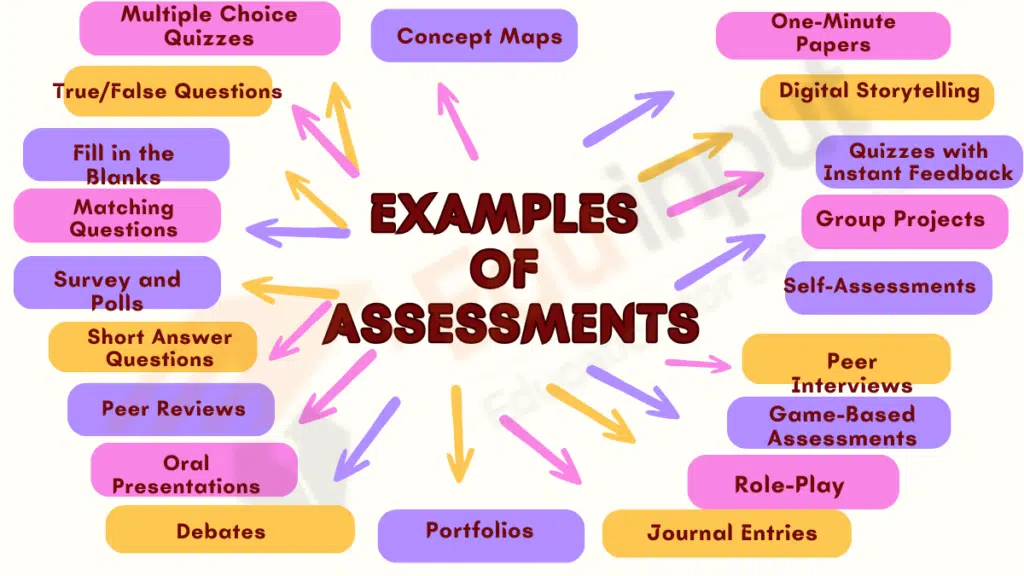20 Examples of Assessments
Assessments are an integral part of the education process, providing teachers with insights into students’ progress and helping students gauge their own understanding of the material.
To make the learning experience more effective, assessments should be authentic, simple, and accessible to students.
In this blog post, we’ll explore 20 examples of assessments that are easy for students to understand and participate in while promoting genuine learning.

Examples of Assessments
1: Multiple Choice Quizzes
A classic assessment method that tests students’ knowledge by presenting multiple answer choices.
2: True/False Questions
Simple and straightforward questions that require students to determine the accuracy of statements.
3: Fill in the Blanks
Students complete sentences with missing words or phrases, demonstrating their comprehension of the material.
4: Matching Questions
Students match items from two columns, connecting related concepts or terms.
5: Short Answer Questions
Require students to provide brief, concise answers to questions, demonstrating their understanding.
6: Peer Reviews
Students assess and provide feedback on their peers’ work, promoting collaboration and critical thinking.
7: Oral Presentations
Students present a topic or project to the class, improving public speaking skills and knowledge retention.
8: Debates
Encourage critical thinking by having students argue for or against a given topic.
9: Concept Maps
Students create visual representations of the relationships between ideas, showing their comprehension of complex topics.
10: Portfolios
Students compile a collection of their work, reflecting on their progress and growth over time.
11: Journal Entries
Encourage reflection and self-assessment by having students maintain a learning journal.
12: Role-Play
Engage students in real-life scenarios, allowing them to apply their knowledge and problem-solving skills.
13: Peer Interviews
Students interview each other to assess their understanding of specific topics or concepts.
14: Self-Assessments
Encourage students to evaluate their own work and understanding, fostering metacognition.
15: Group Projects
Collaborative assignments that assess both individual contributions and teamwork.
16: Quizzes with Instant Feedback
Online platforms can provide immediate feedback to students, enhancing their learning experience.
17: Digital Storytelling
Students create multimedia presentations or narratives to demonstrate their understanding.
18: One-Minute Papers
At the end of a class, students write a brief summary or reflection on the day’s lesson.
19: Survey and Polls
Students create and analyze surveys or polls to gather data and draw conclusions.
20: Game-Based Assessments
Utilize educational games to assess students’ problem-solving and critical thinking skills while making learning fun.
Effective assessments are not just tools for evaluating student performance; they also play a crucial role in facilitating meaningful learning experiences.
By incorporating these 20 authentic and simple assessment methods into your teaching, you can help students grasp complex concepts, develop critical thinking skills, and take ownership of their own learning journeys.
Remember to tailor your assessments to the specific needs and preferences of your students, fostering an inclusive and engaging educational environment.



Leave a Reply